Soon all will become Elvis.
Even if you’re too youthful to remember Mojo Nixon, MTV, and/or the 20th century, you certainly remember Elvis Aron Presley. He’s that guy you keep bumping into in the Adult Superstore; he’s the one who calls you at dinner time to try to sell you a fistful of over-ripe durian trimmings. He’s the guy who makes your hips rock ‘a’ hula.
This is because Elvis is everywhere. Elvis is everybody. Elvis is still the king. Even if he got old and fat and drug addled.
In this, the last week before the son of the wrathful sky god blesses the desert tribes with slightly more UV and a cubic yard of now-useless wrapping paper, we rightfully turn our adulating gaze upon his, the holiest of forms. We bow our heads and briefly stop buying things to praise Elvis as he streaks majestically across the sky, delivering peanut butter and banana sandwiches to all the malnourished children.
That is Mind Control Double Feature #74’s gift to you: the knowledge that an old, obese, (probably) dead popularizer of African-American musical forms has easily obtained the sort of mythical status once reserved for undead, male-chromosome-bereft manger urchins and Cthulhu, Lord of R’lyeh.
Bubba Ho-Tep (2002)
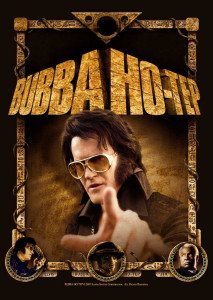 It’s Elvis and John F. Kennedy in a rest home vs. a cursed mummy.
It’s Elvis and John F. Kennedy in a rest home vs. a cursed mummy.
Do I really need to say anything else?
Man, you people! So demanding. But, this is the season of giving things (with gift receipts), so I’ll expound on Don Coscarelli’s Bubba Ho-Tep.
The first thing you should know is that Coscarelli made this film on the cheap, personally taking the picture around the country, much as he did with his latest, John Dies at the End. Even though it never really had a full-on theatrical run, Bubba Ho-Tep built a significant cult following.
How could it not: Elvis and JFK battling a mummy!
So, it turns out in this picture that Elvis is not dead, he’s just old, impotent, and has an unfortunate pecker-located growth. The King—here played brilliantly by Bruce Campbell (of Evil Dead fame)—traded places with an Elvis impersonator in his heyday, then a series of accidents conspired to stick the true king with the pretender’s persona. Too bad, so sad.
Luckily, he gets dumped in the same rest home as John F. Kennedy! That’s right; JFK survived the assassination attempt in Dallas, got dyed black by the secret service for his own protection, and, uh, yeah. Now he’s in a decrepit old age home in Mud Creek, Texas, being played by Ossie Davis, and fighting soul-sucking Egyptian ghouls. Or one ghoul really and some very fake looking giant insects.
Sorry. I got excited.
Some people say that Bubba Ho-Tep is a sly discourse about aging, fame, and self-worth. I say it’s about Elvis and JFK fighting a mummy. It is a debate that will likely never be settled.
Bubba Ho-Tep features raunchy humor, dodgy practical effects, more originality than the big bang, and Elvis and JFK fighting a mummy. I may have mentioned that already, though.
True Romance (1993)
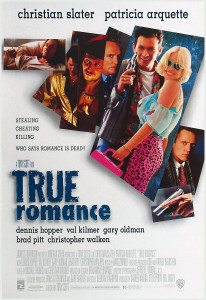 I will now admit to maintaining an unpopular opinion. I think True Romance is Quentin Tarantino’s best film.
I will now admit to maintaining an unpopular opinion. I think True Romance is Quentin Tarantino’s best film.
I know, right? You’re saying: ‘Hey asshole. That’s not even a Quentin Tarantino film!” Which, if that were true, would make a whole lot of other films eligible for being Quentin Tarantino’s best film, but in this case, that isn’t true. The big Q-ball (a nickname I just made up) actually wrote True Romance before he wrote and directed Reservoir Dogs.
Which film—Reservoir Dogs—would be my favorite of his if it weren’t so derivative and if I ever wanted to watch it again, which I don’t. It’s good. I just never seem to have any desire to watch it.
True Romance though. Tarantino wanted to direct the thing himself, but we got lucky, he lost interest, and instead it fell into the lap of Tony Scott—a man not renown for subtlety. Scott rejiggered the script’s non-lineal narrative to match a more traditional march-of-time structure, changed Tarantino’s downer ending, and voila: a hell of a lot of fun.
True Romance is basically the big Q-ball’s wet dream, before he got famous enough to have wet dreams that involved killing Hitler or redeeming America from the scourge of slavery through Italian-interpreted Western exploitation fantasy. Here, everything is much simpler. A film nerd (Christian Slater as Clarence Woorley/QT in his dreams) falls for a call-girl (Patricia Arquette as Alabama), accidentally stumbles onto a suitcase full of narcotics, and—with the help of Elvis (Val Kilmer)—makes a lot of stuff go boom.
Mostly soft, squishy things like people.
The story has drive and direction, the cast is fantastic—with standout appearances by Christopher Walken, Dennis Hopper, and James Gandolfini and seriously weird characters from Gary Oldman, Brad Pitt, Bronson Pinchot, and others.
Actually, this may be Brad Pitt’s best performance in a motion picture.
And throughout it all: Elvis Aron Presley, appearing as an unnamed guardian angel to guide Clarence through his warped, Tarantino-esque version of manhood.
You might attest that Pulp Fiction is brilliant, or that Kill Bill out-meta’s meta, or that no one can nail an Australian accent like the big Q-ball, but I say all that’s hogwash. For my money it’s True Romance. That’s the only film of Quentin’s that I’m reliably happy putting on and watching any old time.
Although, to be perfectly honest, I’m not a big Quentin Tarantino fan. I think he’s vastly overrated, cinematically unintelligible regardless of his intent, and also kind of a buffoon.
Take, for example, what he said about one of the best scenes in True Romance: Dennis Hopper’s monologue about Sicilians, which is delivered facing death, to a gangster played sublimely by Christopher Walken. This is a scene in which Tarantino takes great pride:
I had heard that whole speech about the Sicilians a long time ago, from a black guy living in my house. One day I was talking with a friend who was Sicilian and I just started telling that speech. And I thought: ‘Wow, that is a great scene, I gotta remember that’.
Basically what he’s saying is: “The best scene in my script? I didn’t write it. But I’m really proud of it.”
That’s okay because the big Q-ball isn’t essentially a filmmaker anyway; he’s a collagist. People tend to like his collages but then they also like Coldplay, so there you have it.
Anyway. Elvis. Tarantino got that right. Tony Scott also got the music right, despite choosing Hans Zimmer to score the film. Zimmer lifted his theme for True Romance from Badlands, which had memorably used a section from German composer Carl Orff’s Shulwerk, a piece called Gassenhauer.
Check it out:
Can you imagine? Elvis would never have so blatantly lifted someone else’s work. You’re thinking of Shia LaBeouf. Unless, uh, that is you count the King’s usurpation of popular black musical styles and dance moves to achieve a wealth and fame the originators did not?
I am sorry Lord Elvis. Please do not smite me with your vengeful wrath for insinuating your style came from somewhere other than your brain. Or for not liking Quentin Tarantino a whole heck of a lot. I can’t help it. Surely some well-meaning fanboy will school me hard in the comments anyway?
Have mercy. Don’t be cruel. Treat me like fool. And watch these films.


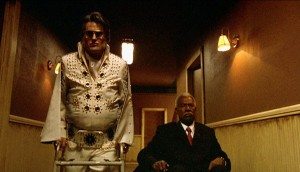
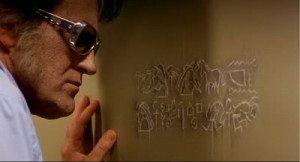
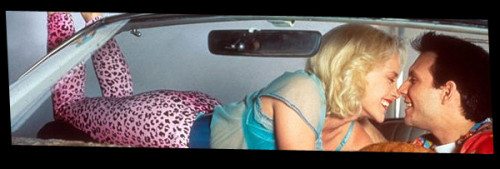
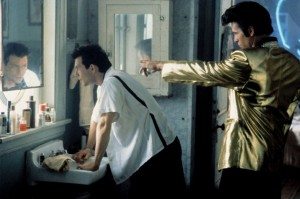
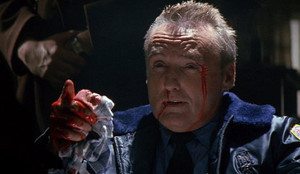
Of note for Bay Area folks: the Castro is showing True Romance on friday, Dec. 27. Unfortunately, due to their having far less understanding of Elvis than we here at SBFMC, they’ve paired it with Pulp Fiction.
Still. I could go for that. Christopher Walken makes up for a lot of Bruce Willis in Pulp Fiction.
I saw Bubba Ho-Teo twice in the theaters. It’s all kinds of wonderful. But I’m surprised by your matter-of-fact description. It is a much more potent film if you take the more realistic end if it: they’re not who they say they are. The mummy itself may just be a figment of their imagination. Either way, it’s a symbol of the artificially preserved simulation of life they are unwilling to accept. They would rather die in their make-believe world than in the reality of the old-age home. It touched me.
I don’t know that I agree, Jason. Firstly, I think—based on the source material, a novella in a collection about Elvis post mortem—that there is question about whether or not they are who they say they are. Secondly, if you say they’d rather die than accept reality, than that takes all of the self-sacrifice out of their actions. They fight to save their neighbors’ souls, not their own; because they’d rather die living fully than succumb to senescence and a world without personality. If the mummy is a figment of their imagination, it makes the film less meaningful to me, not more.
But you’re surprised with my flippancy about the film, which is fair. I just re-watched it and that’s the level I most appreciated it on: elvis and jfk vs mummy! I do think there’s something grander going on, but it’s not definitive or even necessary to enjoy Bubba Ho Tep.
I haven’t read the source material, but it doesn’t make much difference to me. There’s nothing in the movie that requires, or even encourages, us to believe they really are Elvis and JFK. (Even the Elvis flashback scene can be read as a visualization of his fantasy, and not his real history.) But I agree with you here: They WOULD rather die living fully than succumb to senescence and a world without personality. That was my point. They reject the reality of the old-age home. The reality that they are dying old men without anything to live for. So they find something to live for. It doesn’t really matter to me if the mummy is real or not. As I said, “either way.”
Fair enough. There are (at least) two valid ways to read the film.
I far prefer them really being Elvis and JFK—as unlikely as that is—and there being a mummy. A story about old men who imagine a reason to live (and die) is less engaging to me than a story about forgotten heroes who remember their potency and go out fighting.
The only place we may really differ is that I don’t see them rejecting the reality of the old age home. I see them as accepting it as pathetic and awful and still worth fighting for. It is old age. It may be rotten but it leaves them with their souls intact. It is the stealing of the soul that can’t be countenanced—whether that’s through the condescension of nurses or the asshole-sucking of mummies.
Which may be what you were saying as well, just in another way? In which case: hooray! We agree.
In any case: Bubba Ho Tep! Yes. Not nearly as silly as it might seem.
I think we agree much more than we disagree. We agree that it is best read as a film about renewed vigor and potency, and about going out fighting. In my understanding, they’re fighting against the reality of the old-age home. They reject it, because they recognize it as awful and pathetic, and an insult to their dignity.
What’s hard for me to come to terms with is the extent of their dementia. If they are totally nuts, and really believe they are JFK and Elvis (and that there really is a mummy), then their heroism is as admirable as it is pathetic. But if they have doubt–and Elvis does have a moment of doubt, which we could take to be very significant–then they are aware that this all might be pathetic. They might be just a couple old men battling windmills. And yet they still fight. That’s pretty awesome to me. And the fact that they really are nuts (if they are) doesn’t matter so much.
I do have a reason for preferring to think they are not really JFK and Elvis, which I think I can explain pretty easily. On the one hand, it’s a stretch to expect the audience to accept their stories (not to mention the coincidence that they would be in the same old-age home). But more than just the implausibility of that, there’s the fact that the two old men have very little trouble believing each other. You might say we’re just supposed to play along and not wonder why an old, black JFK would believe that this old guy is actually Elvis, and why Elvis would think this old, black guy is actually JFK. But it is much more believable to think that they don’t really believe each other, but they play along with each other, because they know how important it is to play along. Maybe they know conciously, maybe unconsciously. But they know, because they are both already playing the same make-believe game.
That makes sense. I guess I don’t expect or want Bubba Ho Tep to make that kind of sense, though. The unbelievability of the story is precisely what I enjoy most. Yes; it’s fantastical. That’s what makes it awesome.
I just did a little research and found strong evidence that the original story is actually about old men who are not really who they say they are, and that Bubba Ho-Tep is not a real mummy. At the end of Lansdale’s story, there is a suggestion that it’s just a scarecrow.
That makes me sad. I will cling to my illusions of reality like a decrepit old charlatan clings to the belief that he is Elvis Aron Presley. i.e. To The Death.
Here’s what I found. The author of this analysis gets a bit too caught up in trying to give a scientific foundation for the story. But his discussion of the film and novella are interesting. But maybe I’m just saying that because he agrees with me. :)
http://chateau128.com/2012/07/02/the-forgetting-forgotten-pathologicial-memory-loss-and-identity-in-bubba-ho-tep/
To me, the story is all that much more powerful and touching. Interesting that you have the opposite reaction.
Powerful and touching: yes. Fantastic and thrilling: no.
I always looked to Bubba Ho Tep for the latter with a taste of the former rather than vice versa.
I read the first sentence of that article and was smart enough to realize it isn’t for me: “The concept of Don Coscarelli’s 2003 film Bubba Ho-tep is as inane as it is unlikely.”
Inane? Try genius.
By the way, I did read the source book (and sequel) for Coscarelli’s latest film, John Dies at the End. I don’t recommend it. The film is much much better.
Don’t judge the article by that line. The author has a great deal of admiration for the movie. And he takes the concept very seriously. He doesn’t think it’s inane. I think he’s pandering to those people who might not like a movie and JFK and Elvis fighting a mummy.
I haven’t seen John Dies at the End, but I’ve already the many praises it’s received on your site.
Man I wish I could edit my posts here. I make so many typos it’s not funny.
Don’t worry about it, Jason. We have too many typos in our articles, and we can edit them…
I’ll read that article. But maybe not today. Fighting a cold.